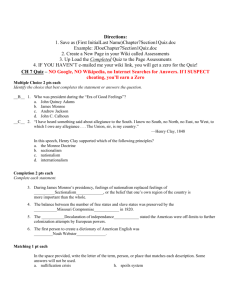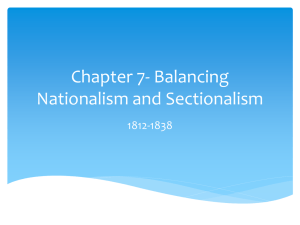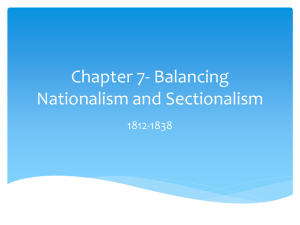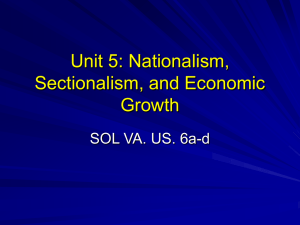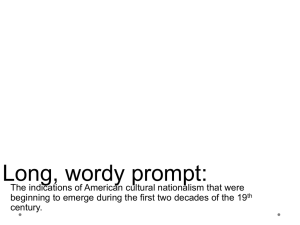2 Nationalism at Center Stage
advertisement
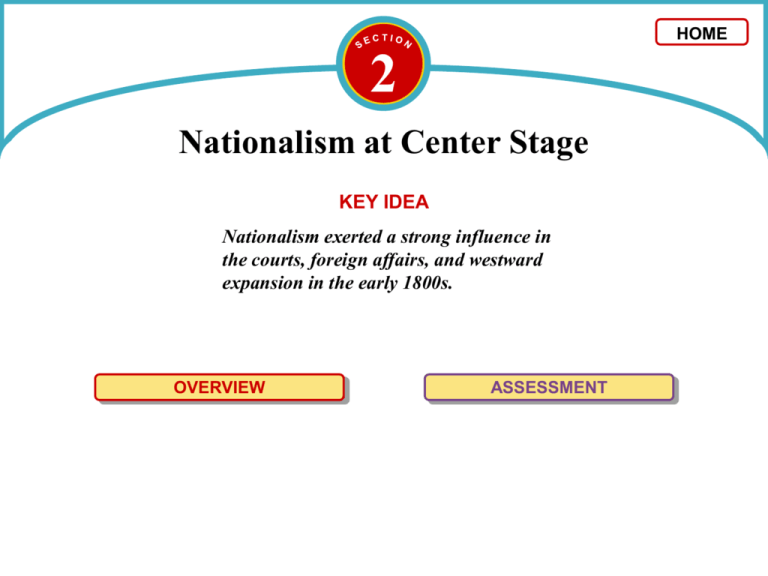
HOME 2 Nationalism at Center Stage KEY IDEA Nationalism exerted a strong influence in the courts, foreign affairs, and westward expansion in the early 1800s. OVERVIEW ASSESSMENT HOME 2 Nationalism at Center Stage OVERVIEW MAIN IDEA WHY IT MATTERS NOW Nationalism exerted a strong influence in the courts, foreign affairs, and westward expansion in the early 1800s. Nationalism continues to affect such decisions as whether or not we should involve the country in foreign conflicts and what limits can be placed on business, communications, and other trade. TERMS & NAMES • Adams-Onís Treaty • nationalism • McCulloch v. Maryland • John Quincy Adams • Monroe Doctrine • Missouri Compromise ASSESSMENT HOME 2 Nationalism at Center Stage ASSESSMENT 1. Look at the chart below. For each of the three topics shown, give examples that illustrate the influence of nationalism. Influences of Nationalism Nation’s Courts Foreign Affairs The Gibbons v. Ogden decision allows federal government to regulate interstate commerce. United States and Canada demilitarize their common border via the Rush-Bagot Treaty. Spain surrenders Florida in the AdamsOnís Treaty. The Monroe Doctrine warns European powers to end intervention in Western Hemisphere. Westward Expansion U.S. territories expand westward; American settlers push into the Northwest. continued . . . 2 HOME Nationalism at Center Stage ASSESSMENT 2. What short-and long-term goals might President Monroe have had in mind when he formulated the Monroe Doctrine in 1823? Think About: • European nations’ presence in the Western Hemisphere • the influence of nationalism on foreign policy • the nation’s westward expansion ANSWER • protect American trade • diminish the power of Spain, Portugal, France, and Russia in the Western Hemisphere • provide for national security • encourage continuing U.S. territorial expansion in the Western Hemisphere continued . . . HOME 2 Nationalism at Center Stage ASSESSMENT 3. What agreements did Congress reach that are regarded collectively as the Missouri Compromise? Why were they important at the time? ANSWER Maine, Missouri admitted as free states; Louisiana split; slavery legal south of dividing line and banned north of it; sectional balance in Senate maintained; slavery issue settled temporarily continued . . . 2 HOME Nationalism at Center Stage ASSESSMENT 4. From what you know about the Missouri Compromise and the controversy that preceded it, do you think the new spirit of nationalism in the United States was strong or fragile? Support your opinion. ANSWER Strong: Loyalty to the Union prevailed over sectionalism; Northerners and Southerners maintained national unity. Fragile: Missouri Compromise was temporary, limited in scope. Slavery issue still unresolved and divisive. End of Section 2
![“The Progress of invention is really a threat [to monarchy]. Whenever](http://s2.studylib.net/store/data/005328855_1-dcf2226918c1b7efad661cb19485529d-300x300.png)

